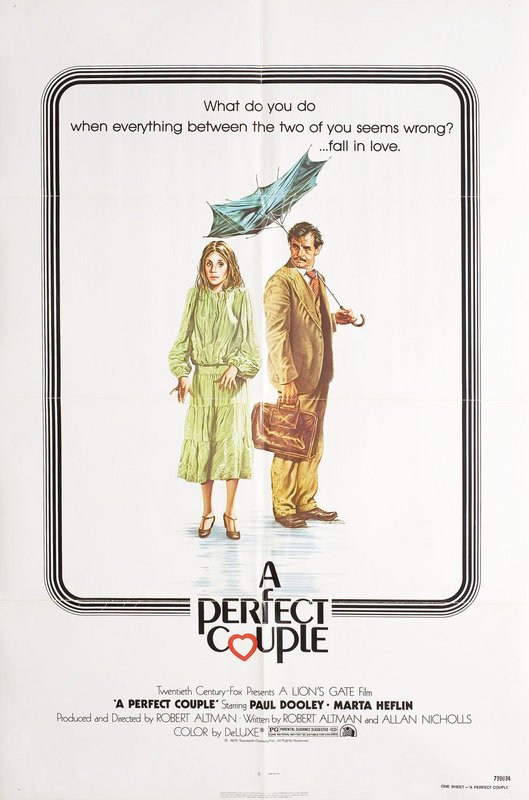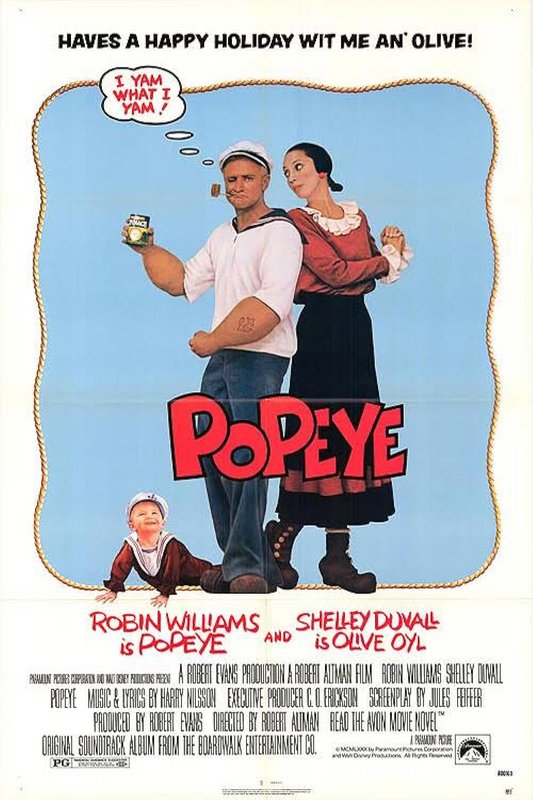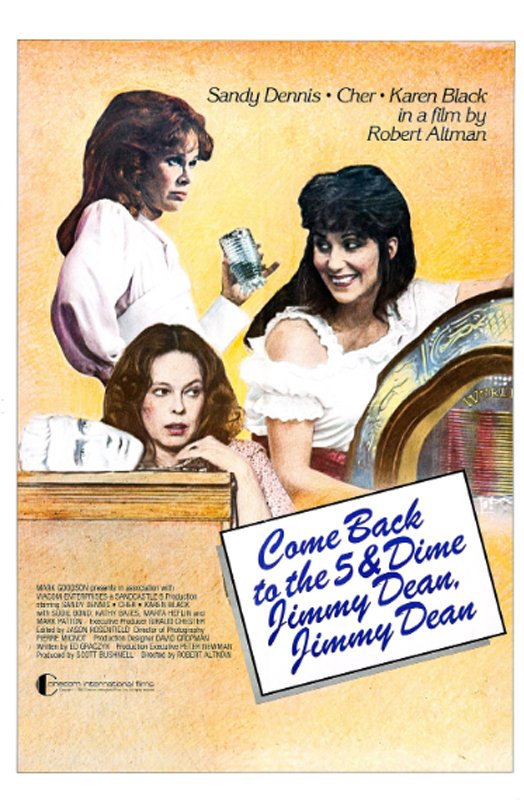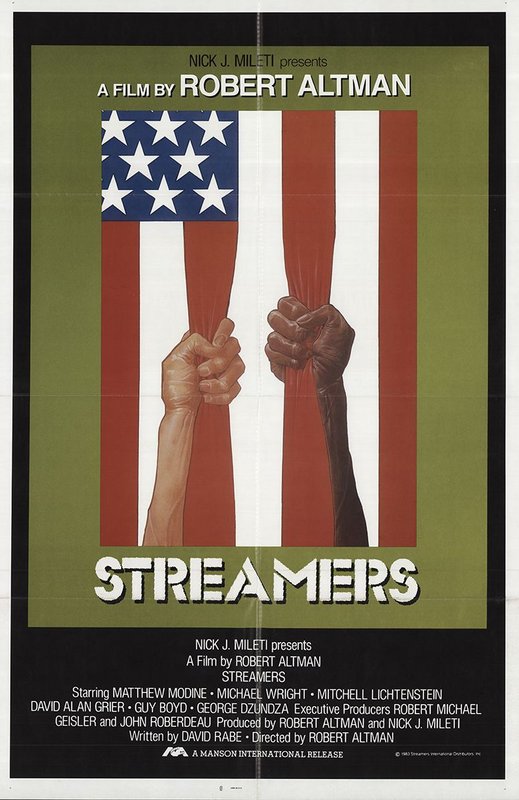
A Perfect Couple - 1979
Directed by Robert Altman
Written by Allan F. Nicholls & Robert Altman
Starring Paul Dooley, Marta Heflin, Titos Vandis & Belita Moreno
You know you're going to get something unusual from a Robert Altman movie, so it comes as no surprise to hear that A Perfect Couple is a very curious and out of the ordinary romantic comedy - veering towards being a musical, though most of the music numbers are of the diegetic kind. Altman's idea for the film was to show us a love story where the two leads were just two ordinary people ("schlumps" is the word he uses) and for this he nabbed Paul Dooley (who played one of the main characters in A Wedding) and Marta Heflin (who'd also been in A Wedding) as his two leads. The movie plays so unconventionally that I genuinely didn't know what was in store for us - it's a playfully enigmatic romance. Sheila (Heflin) and Alex (Dooley) have a courting that's so off the rails the film earns top marks for being original - and while that's what most of us want when we watch a movie, I'd say be careful what you wish for. Your taste in music and amenability to the flawed personalities of our two main characters might be what makes or breaks A Perfect Couple for you.
Paul and Sheila both subscribe to a dating service, hooking up by watching taped Q&A sessions with prospective partners. Their first date is an absolute disaster, and that's not the only factor which will work against them. Paul's Greek family is ruled by it's patriarch, his father Panos (Titos Vandis) who is unusually strict and traditional - so much so Paul hides the fact he's dating Sheila. His sister, Eleousa (Belita Moreno), is dying. Paul and Eleousa are desperate to escape the overbearing and stifling atmosphere at home, whereas brother-in-law Fred Bott (Henry Gibson) is all too ready to play along. Meanwhile, Sheila deals with a strict patriarch of her own - band-leader Teddy (Ted Neeley), who drives his singers and musicians hard in rehearsals performance-wise and other than that fines them for even small infractions. She lives in a loft with all the other band-members, sacrificing much privacy, and experiencing the same kind of lack of control over her life. Paul and Sheila's love life will go on to experience one disaster after another - but something keeps on pulling them back to each other, and they do have the advantage of having both seen each other at their worst. Perhaps that's love, and a perfect couple.
I say love, but the first time I watched A Perfect Couple I thought Sheila hated Paul - and watching Paul's pushy insistence he see Sheila off at her door and kiss her made me very uncomfortable. Multiple times she tries to fend him off, and get him to leave - and by the end I was telling him aloud "Dude, she said no!" It was this that confused me a great deal about the film. Sheila is simply shy and reserved, but this can easily be misinterpreted as not being interested - making Paul's pushy insistence on kissing and demanding they go on more dates look like he's unaware that Sheila's not that into him. Only when she opens up a little later in the film do we understand her feelings in the matter, and as a result the film becomes less prickly. I honestly thought we were heading into stalker territory - especially when, after a mix-up, Sheila starts dating someone else and it's Paul who arrives unannounced, fighting the other guy regardless of what Sheila has to say about the matter. My feelings about all of this might stem from the fact that Paul isn't your typical heart-throb figure, and that perhaps in any other romantic comedy I've ever seen, he probably wouldn't be winning the girl over in such a clumsy manner.
One other aspect of the movie that might tip it into unfavourable territory is the music. Keepin' 'Em Off The Streets had been assembled by Allan F. Nicholls not too long before production on this film commenced, and they get to perform quite a few numbers during the film - around a dozen in all. I liked a few of the songs, but there were some that didn't quite come off as well. It doesn't kill the film, but seeing as the back-half is so music-heavy a couple of mediocre songs strung back to back really kills the mood. Hearing Jesus Christ Superstar's Ted Neeley belt out a few numbers was cool though - I'd only ever heard him as Jesus in that film, and I really enjoy him playing the lead role in that movie rendition of the musical. Marta Heflin does a great job singing Won't Somebody Care as well, seeing as we don't hear her as a vocalist as much as the other band members. In my opinion, I thought there were probably 3 or so songs too many that bog the film down - some of the weaker numbers that insist on dragging the last 20 or so minutes out as long as they do. I'd enjoyed the music up to a point, but it overstays it's welcome.
Out of all the reviews I read for A Perfect Couple, the most interesting item of observation was from Penelope Gilliatt of The New Yorker, who talked about Altman "working too fast", and although her comments about this not being a "closely thought-out film" (such a comment seems to show a lack of awareness about Altman films in general) is both on the money but at the same time (in a contradictory sense) an understandable misinterpretation, I also get the feeling that he was rushing through. He had a novice cinematographer in Edmond L. Koons, who wouldn't last long in the business, and his old friend and long-time collaborator Tony Lombardo in the editing suite - but this isn't a film that puts much stock in technical qualifications. Instead, Altman wants to explore the spontaneous thoughts of his actors in an almost rough, documentary style of filmmaking. He'll send some characters to interrupt Paul and Sheila, who are about to make love, but it distinctly sounds like the reasons they have for interrupting have been made up on the fly, and as is usual in many of his films, dialogue is probably left to them completely - in other words, it hasn't been written down at all.
In the end, what it all amounts to is one of Robert Altman's least seen films. It doesn't demand to be seen as a great work of art, but it does stand as another interesting experiment by a filmmaker who was totally unafraid of trying something completely different. Of course, in many previous instances his experimentation proved pure genius, and his experiments masterpieces. It wasn't until this late 70s portion of his career that his experiments sometimes seemed a little lacking in execution and foresight. I can't count the number of times I've been watching a cinematic romance thinking, "Why can't they just get two average people? I'd really be able to believe in a film that did that." Now I'm faced with the ultimate truth of what that really feels like. A small portion of me is shame-facedly leaning over to the person casting this and whispering carefully "Can we still get Brad Pitt?" I'm exaggerating of course - in a way that tries to explain how conflicted I felt while watching a guy with average looks and awkward, deficient personality stumble through a disaster-ridden courtship. Marta Heflin is good looking, and there have been no end of shy girls in romantic dramas or comedies, so the same doesn't go for her in this.
Spread throughout, there are an inestimable number of little Altman jokes - often dependent on the improvisatory skills of the performers. Henry Gibson and Allan F. Nicholls, two Altman regulars, do the best with what they're given. Moments of fun and comedy aren't telegraphed like they'd be in a big high-budget Hollywood comedy - so it takes great concentration to get the most out of A Perfect Couple. Often it's the throwaway remark, the pratfall in the background or the slight change of expression - and the good thing about this is that when one of these comedic moments doesn't land, it's not particularly obvious it was even there. Marta Heflin is the enigma - she didn't go on to have a big career - hardly one at all actually. Paul Dooley flirts with making his character unsympathetic - and it's only once you can see the film as a whole you see he's a likable guy. There's no great performer here that that really demands attention, or any performance that's cinematically satisfying - so your enjoyment depends on how you grade the experiment. If you like the music of Keepin' 'Em Off The Streets (their music dominated the latter half of the film), Altman's sense of humour and Dooley, chances are you'll find this eccentric and enjoyable. If you can't stand the chaos, the music is hurting your ears and you find Dooley annoying, chances are you'll dislike this very much. I landed somewhere in the middle. A Perfect Couple is a long, long way from being a perfect movie, but it's a daring one at least.
__________________
Remember - everything has an ending except hope, and sausages - they have two.
We miss you Takoma
We miss you Takoma
Latest Review : Le Circle Rouge (1970)



